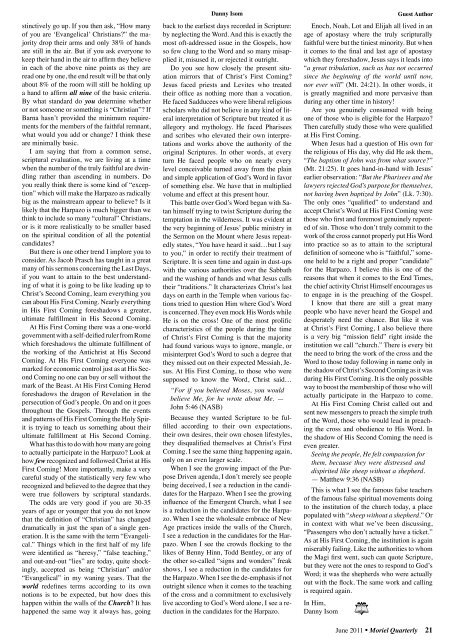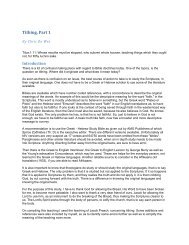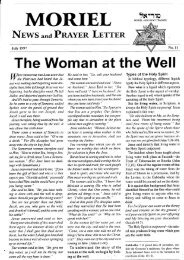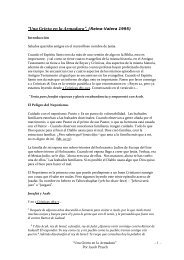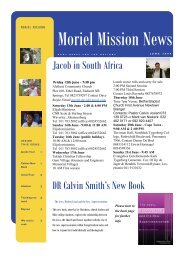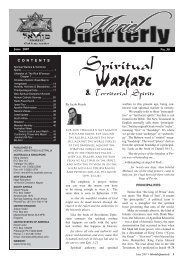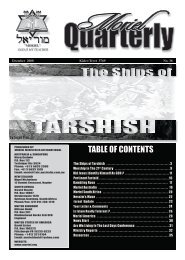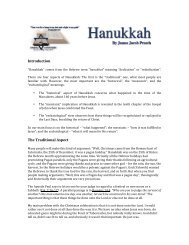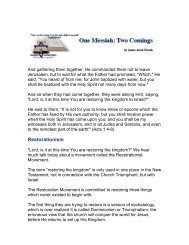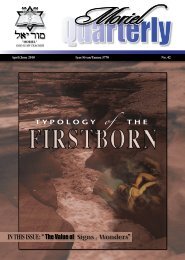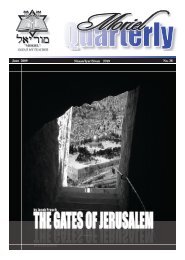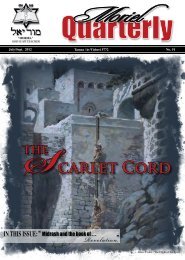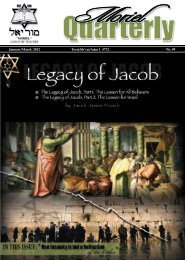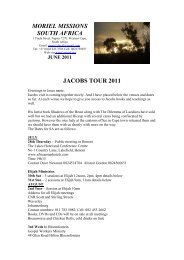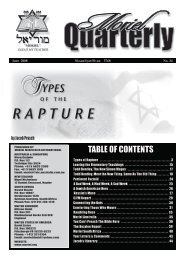April/June 20 No. 46 Nisan/Iyar//Sivan 577 - Moriel Ministries
April/June 20 No. 46 Nisan/Iyar//Sivan 577 - Moriel Ministries
April/June 20 No. 46 Nisan/Iyar//Sivan 577 - Moriel Ministries
You also want an ePaper? Increase the reach of your titles
YUMPU automatically turns print PDFs into web optimized ePapers that Google loves.
stinctively go up. If you then ask, “How many<br />
of you are ‘Evangelical’ Christians?” the majority<br />
drop their arms and only 38% of hands<br />
are still in the air. But if you ask everyone to<br />
keep their hand in the air to affirm they believe<br />
in each of the above nine points as they are<br />
read one by one, the end result will be that only<br />
about 8% of the room will still be holding up<br />
a hand to affirm all nine of the basic criteria.<br />
By what standard do you determine whether<br />
or not someone or something is “Christian”? If<br />
Barna hasn’t provided the minimum requirements<br />
for the members of the faithful remnant,<br />
what would you add or change? I think these<br />
are minimally basic.<br />
I am saying that from a common sense,<br />
scriptural evaluation, we are living at a time<br />
when the number of the truly faithful are dwindling<br />
rather than ascending in numbers. Do<br />
you really think there is some kind of “exception”<br />
which will make the Harpazo as radically<br />
big as the mainstream appear to believe? Is it<br />
likely that the Harpazo is much bigger than we<br />
think to include so many “cultural” Christians,<br />
or is it more realistically to be smaller based<br />
on the spiritual condition of all the potential<br />
candidates?<br />
But there is one other trend I implore you to<br />
consider. As Jacob Prasch has taught in a great<br />
many of his sermons concerning the Last Days,<br />
if you want to attain to the best understanding<br />
of what it is going to be like leading up to<br />
Christ’s Second Coming, learn everything you<br />
can about His First Coming. Nearly everything<br />
in His First Coming foreshadows a greater,<br />
ultimate fulfillment in His Second Coming.<br />
At His First Coming there was a one-world<br />
government with a self-deified ruler from Rome<br />
which foreshadows the ultimate fulfillment of<br />
the working of the Antichrist at His Second<br />
Coming. At His First Coming everyone was<br />
marked for economic control just as at His Second<br />
Coming no one can buy or sell without the<br />
mark of the Beast. At His First Coming Herod<br />
foreshadows the dragon of Revelation in the<br />
persecution of God’s people. On and on it goes<br />
throughout the Gospels. Through the events<br />
and patterns of His First Coming the Holy Spirit<br />
is trying to teach us something about their<br />
ultimate fulfillment at His Second Coming.<br />
What has this to do with how many are going<br />
to actually participate in the Harpazo? Look at<br />
how few recognized and followed Christ at His<br />
First Coming! More importantly, make a very<br />
careful study of the statistically very few who<br />
recognized and believed to the degree that they<br />
were true followers by scriptural standards.<br />
The odds are very good if you are 30-35<br />
years of age or younger that you do not know<br />
that the definition of “Christian” has changed<br />
dramatically in just the span of a single generation.<br />
It is the same with the term “Evangelical.”<br />
Things which in the first half of my life<br />
were identified as “heresy,” “false teaching,”<br />
and out-and-out “lies” are today, quite shockingly,<br />
accepted as being “Christian” and/or<br />
“Evangelical” in my waning years. That the<br />
world redefines terms according to its own<br />
notions is to be expected, but how does this<br />
happen within the walls of the Church? It has<br />
happened the same way it always has, going<br />
Danny Isom<br />
back to the earliest days recorded in Scripture:<br />
by neglecting the Word. And this is exactly the<br />
most oft-addressed issue in the Gospels, how<br />
so few clung to the Word and so many misapplied<br />
it, misused it, or rejected it outright.<br />
Do you see how closely the present situation<br />
mirrors that of Christ’s First Coming?<br />
Jesus faced priests and Levites who treated<br />
their office as nothing more than a vocation.<br />
He faced Sadducees who were liberal religious<br />
scholars who did not believe in any kind of literal<br />
interpretation of Scripture but treated it as<br />
allegory and mythology. He faced Pharisees<br />
and scribes who elevated their own interpretations<br />
and works above the authority of the<br />
original Scriptures. In other words, at every<br />
turn He faced people who on nearly every<br />
level conceivable turned away from the plain<br />
and simple application of God’s Word in favor<br />
of something else. We have that in multiplied<br />
volume and effect at this present hour.<br />
This battle over God’s Word began with Satan<br />
himself trying to twist Scripture during the<br />
temptation in the wilderness. It was evident at<br />
the very beginning of Jesus’ public ministry in<br />
the Sermon on the Mount where Jesus repeatedly<br />
states, “You have heard it said…but I say<br />
to you,” in order to rectify their treatment of<br />
Scripture. It is seen time and again in dust-ups<br />
with the various authorities over the Sabbath<br />
and the washing of hands and what Jesus calls<br />
their “traditions.” It characterizes Christ’s last<br />
days on earth in the Temple when various factions<br />
tried to question Him where God’s Word<br />
is concerned. They even mock His Words while<br />
He is on the cross! One of the most prolific<br />
characteristics of the people during the time<br />
of Christ’s First Coming is that the majority<br />
had found various ways to ignore, mangle, or<br />
misinterpret God’s Word to such a degree that<br />
they missed out on their expected Messiah, Jesus.<br />
At His First Coming, to those who were<br />
supposed to know the Word, Christ said…<br />
“For if you believed Moses, you would<br />
believe Me, for he wrote about Me. —<br />
John 5:<strong>46</strong> (NASB)<br />
Because they wanted Scripture to be fulfilled<br />
according to their own expectations,<br />
their own desires, their own chosen lifestyles,<br />
they disqualified themselves at Christ’s First<br />
Coming. I see the same thing happening again,<br />
only on an even larger scale.<br />
When I see the growing impact of the Purpose<br />
Driven agenda, I don’t merely see people<br />
being deceived, I see a reduction in the candidates<br />
for the Harpazo. When I see the growing<br />
influence of the Emergent Church, what I see<br />
is a reduction in the candidates for the Harpazo.<br />
When I see the wholesale embrace of New<br />
Age practices inside the walls of the Church,<br />
I see a reduction in the candidates for the Harpazo.<br />
When I see the crowds flocking to the<br />
likes of Benny Hinn, Todd Bentley, or any of<br />
the other so-called “signs and wonders” freak<br />
shows, I see a reduction in the candidates for<br />
the Harpazo. When I see the de-emphasis if not<br />
outright silence when it comes to the teaching<br />
of the cross and a commitment to exclusively<br />
live according to God’s Word alone, I see a reduction<br />
in the candidates for the Harpazo.<br />
Enoch, <strong>No</strong>ah, Lot and Elijah all lived in an<br />
age of apostasy where the truly scripturally<br />
faithful were but the tiniest minority. But when<br />
it comes to the final and last age of apostasy<br />
which they foreshadow, Jesus says it leads into<br />
“a great tribulation, such as has not occurred<br />
since the beginning of the world until now,<br />
nor ever will” (Mt. 24:21). In other words, it<br />
is greatly magnified and more pervasive than<br />
during any other time in history!<br />
Are you genuinely consumed with being<br />
one of those who is eligible for the Harpazo?<br />
Then carefully study those who were qualified<br />
at His First Coming.<br />
When Jesus had a question of His own for<br />
the religious of His day, why did He ask them,<br />
“The baptism of John was from what source?”<br />
(Mt. 21:25). It goes hand-in-hand with Jesus’<br />
earlier observation: “But the Pharisees and the<br />
lawyers rejected God’s purpose for themselves,<br />
not having been baptized by John” (Lk. 7:30).<br />
The only ones “qualified” to understand and<br />
accept Christ’s Word at His First Coming were<br />
those who first and foremost genuinely repented<br />
of sin. Those who don’t truly commit to the<br />
work of the cross cannot properly put His Word<br />
into practice so as to attain to the scriptural<br />
definition of someone who is “faithful,” someone<br />
held to be a right and proper “candidate”<br />
for the Harpazo. I believe this is one of the<br />
reasons that when it comes to the End Times,<br />
the chief activity Christ Himself encourages us<br />
to engage in is the preaching of the Gospel.<br />
I know that there are still a great many<br />
people who have never heard the Gospel and<br />
desperately need the chance. But like it was<br />
at Christ’s First Coming, I also believe there<br />
is a very big “mission field” right inside the<br />
institution we call “church.” There is every bit<br />
the need to bring the work of the cross and the<br />
Word to those today following in name only in<br />
the shadow of Christ’s Second Coming as it was<br />
during His First Coming. It is the only possible<br />
way to boost the membership of those who will<br />
actually participate in the Harpazo to come.<br />
At His First Coming Christ called out and<br />
sent new messengers to preach the simple truth<br />
of the Word, those who would lead in preaching<br />
the cross and obedience to His Word. In<br />
the shadow of His Second Coming the need is<br />
even greater.<br />
Seeing the people, He felt compassion for<br />
them, because they were distressed and<br />
dispirited like sheep without a shepherd.<br />
— Matthew 9:36 (NASB)<br />
This is what I see the famous false teachers<br />
of the famous false spiritual movements doing<br />
to the institution of the church today, a place<br />
populated with “sheep without a shepherd.” Or<br />
in context with what we’ve been discussing,<br />
“Passengers who don’t actually have a ticket.”<br />
As at His First Coming, the institution is again<br />
miserably failing. Like the authorities to whom<br />
the Magi first went, such can quote Scripture,<br />
but they were not the ones to respond to God’s<br />
Word; it was the shepherds who were actually<br />
out with the flock. The same work and calling<br />
is required again.<br />
In Him,<br />
Danny Isom<br />
Guest Author<br />
<strong>June</strong> <strong>20</strong>11 • <strong>Moriel</strong> Quarterly 21


